2021 Honda Accord Hybrid First Drive - Green Prestige Not Piety
It's lucky that the 2021 Honda Accord Hybrid has "HYBRID" badges on its trunk and fenders, else you'd be forgiven for not knowing it was electrified at all. Then again, hybrid subtlety is part of the new Accord's charm, positioning the technology not so much as the green option, but the more premium, sophisticated pick of the sedan range.
The minimal aesthetic changes over the regular Accord are part of that, though it doesn't mean the new hybrid is lacking in design. For 2021, Honda kept the changes subtle: a wider grille, more LEDs for the front and rear lights, and a cleaner integration of the Honda Sensing sensors.
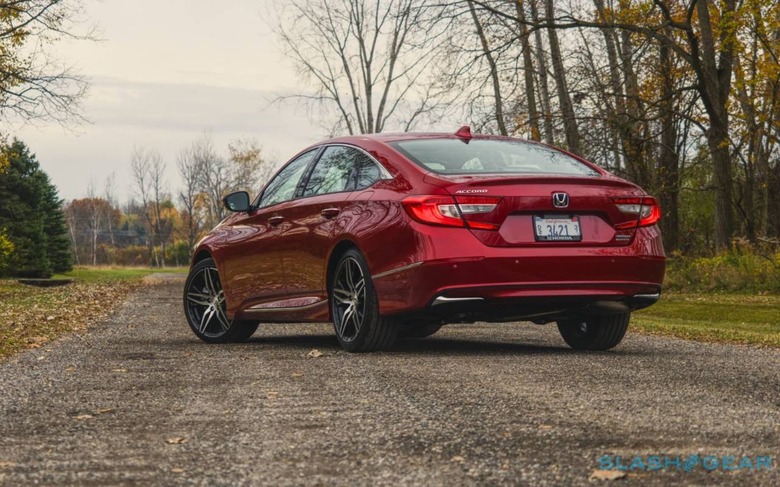
It leaves the Accord Hybrid looking mature but not staid, which is probably just the balance Honda was trying to strike. I like the sharp crease-line that arcs up from the headlamps, over the doors with their concave surfacing, and flows down into the rear light clusters, while the way the chrome bar spanning the fascia links with the DRLs underneath is a neat touch, too. Honda's challenge is balancing the tastes of old buyers and new, since the Accord is not only one of its primary gateways into ownership for younger drivers, but regularly sees existing owners swap their current Accord for a newer version.
The big news here is the drivetrain. The Accord Hybrid uses the latest iteration of what Honda calls its "two-motor hybrid" system: a 2.0-liter Atkinson-cycle inline-4 gas engine combined with an electric motor and a li-ion battery. Since it's not a plug-in hybrid there's no way to externally charge that battery: instead, it soaks up spare power from the gas engine, or the power recovered through regenerative braking when the sedan slows down.
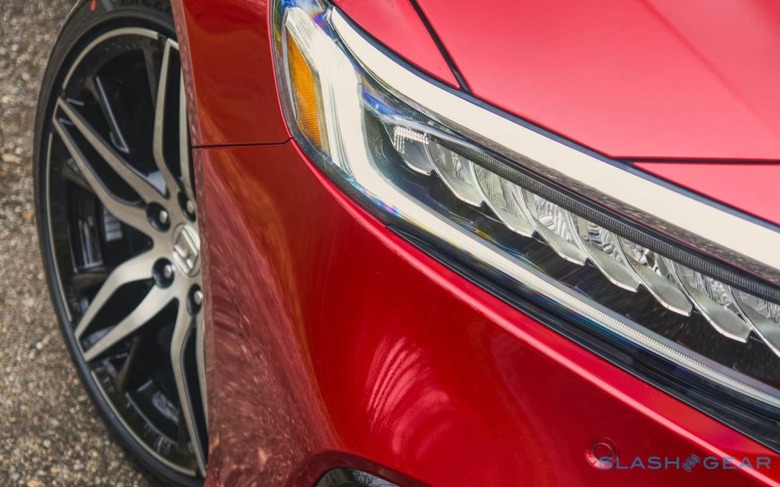
Together, engine and motor deliver 212 horsepower and 232 lb-ft of torque. That means 20 hp and 40 lb-ft more than the regular Accord's 1.5-liter turbo offers, in the process cutting a second from its 0-60 mph time. Economy is up as you'd expect, too, and not by a small amount. The 2021 Accord Hybrid is rated for 48 mpg across the board, for city, highway, and combined – though Touring trim sees those dip to 44 mpg, 41 mpg, and 43 mpg respectively – while the Accord 1.5T manages 30 mpg, 38 mpg, and 33 mpg respectively.
Factor in the promise of a perkier throttle response when you hit the accelerator, and the question becomes why wouldn't you go for the hybrid. Pricing remains, of course, one such reason. Where you can pick up an entry-level 2021 Accord LX for $24,770 (plus $995 destination), the cheapest new Accord Hybrid starts at $26,370 (plus $995 destination), a $1,600 premium.
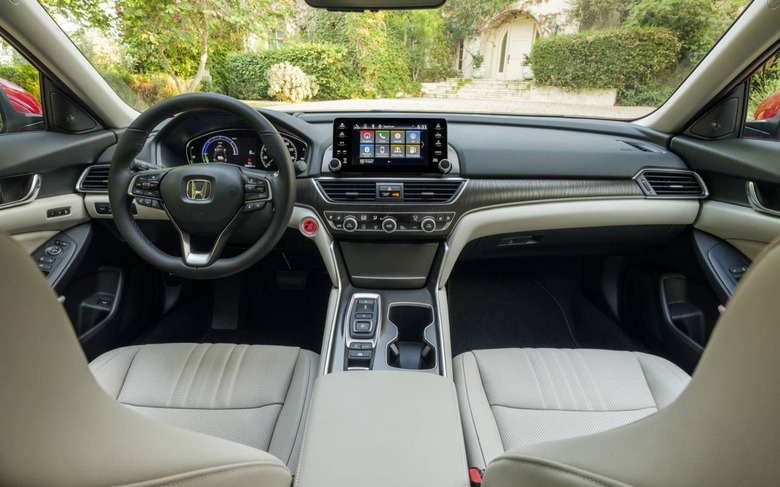
On the road, you don't have to do much driving to realize it's worth the extra spend. By default, the Accord Hybrid will pick how to blend its power sources: only electric power driving the wheels; the gas engine acting as an electric generator; or the gas engine directly linked to the wheels via a clutch. An ECON mode button tames the accelerator pedal for better efficiency, while a SPORT button does the opposite and, on Touring models with Honda's adaptive dampers, firms up the ride in addition to adjusting the steering response.
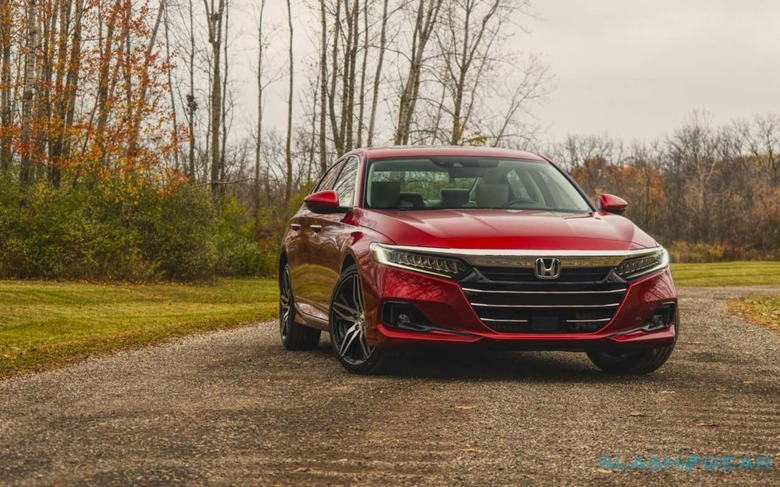
Hit the EV button and you can drive for up to a mile on electric power only, though you'll need to baby the throttle in order to avoid the Accord Hybrid waking up its gas half.
What I spent more time tweaking, though, is the regenerative braking. Like other electrified cars, the 2021 Accord Hybrid initially relies on its motors acting in reverse, as generators, when you want to slow the car. Only for maximum braking performance do the physical anchors kick in. By default, though, you hardly feel the Honda's regen at work, but you can pull the left paddle to ramp up the effect, much in the same way that downshifting a traditional car would bring engine braking into play.
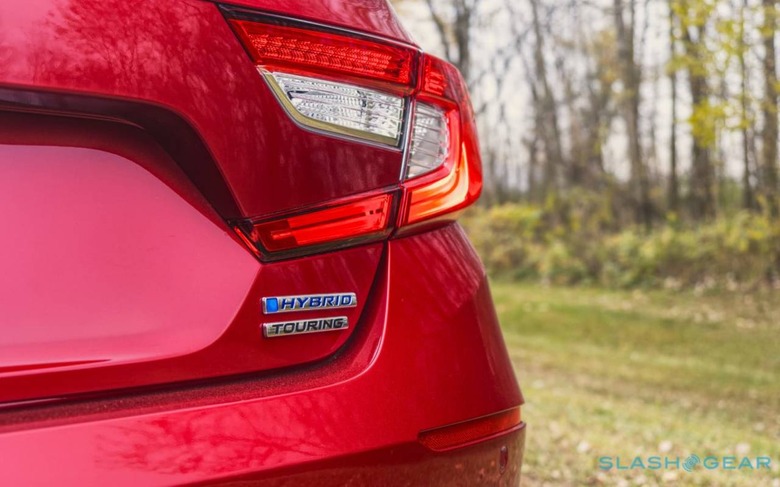
It's not a set-and-forget system. In Normal and ECON modes, the level of regen you set will switch back to the default after about a minute, or after you manually slow the car with the brakes. In SPORT, the Accord Hybrid is happier to leave the regen level as you've set it – again, unless you brake manually – which is how I'd prefer all of the modes to behave.
Foibles aside, it's not just a solid hybrid but a solid sedan, period, in which to find yourself behind the wheel. With the remapped accelerator it feels more spritely, the electric motor helping fill in as you pull away from a standing start, and lending a welcome perkiness in urban traffic. What stands out is how smoothly the various systems hand over to each other: electric to gas and back again; regenerative braking to physical. There may be two motors at play, but they cooperate neatly.
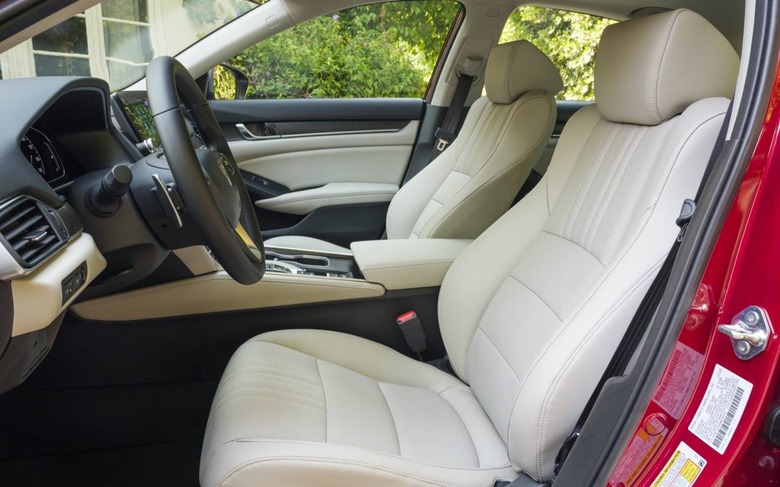
There are still some giveaways beyond the gauges that you're driving a hybrid. Most obvious is the soundtrack, with the noise from the 2.0-liter gas engine not always matching what your other senses tell you the car is doing. There's much less, thankfully, of that weird "rubber-band" feeling when you hit the throttle and then wait for the drivetrain to catch up. It's not as direct as a pure-EV, but it's much better than some other hybrids out there.
The big advantage over those purely-electric cars, of course, is the flexibility. Fill up the tank, Honda says, and you could go on a 600 mile road trip in the new Accord Hybrid. No EV can match that on a single charge, nor the speed of filling up with gas. The sedan's smooth ride makes it an ideal cruiser, and with adaptive cruise control with lane-keeping assistance as standard as part of the Honda Sensing package, it dispatches highway miles as comfortably as it does them economically.
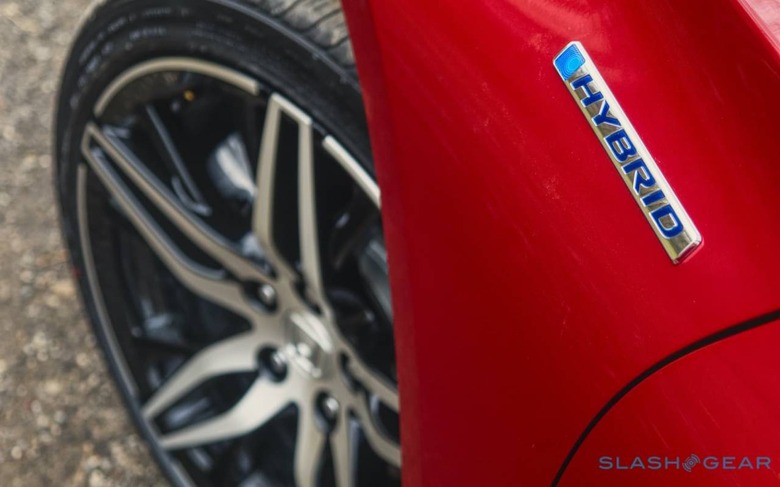
For 2021, Honda Sensing upgrades its lane-keeping and refines the adaptive cruise behavior. I like that, unlike many such systems, you can have the lane-assistance on even without the cruise control active, meaning it's useful off the highway on sweeping country roads as well. Low speed braking control – which uses the parking sensors to hit the brakes if you're about to have a parking lot mishap at <6 mph speeds - comes standard on the Accord Hybrid Touring trim.
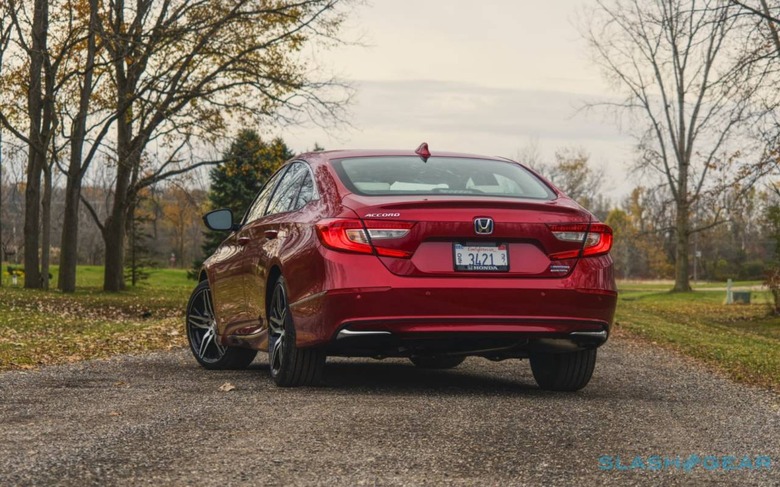
All of the Hybrid versions get the touchscreen infotainment system, wired Apple CarPlay and Android Auto, dual-zone HVAC, and a rear seatbelt reminder. EX and above trims get rear USB ports for charging and a wireless phone charging pad, as well as wireless CarPlay and Android Auto, a power moonroof, 12-way power driver's seat, blind-spot alerts, and heated front seats.
EX-L trim adds leather to the seats and steering wheel, plus an audio upgrade and power adjustment for the front passenger seat, while the top Touring trim – which Honda expects to comprise 30-percent of all Accord Hybrid sales – throws in 19-inch alloy wheels, adaptive dampers, navigation, a head-up display, front ventilated seats, rear heated seats, and parking sensors for $36,240 plus destination.
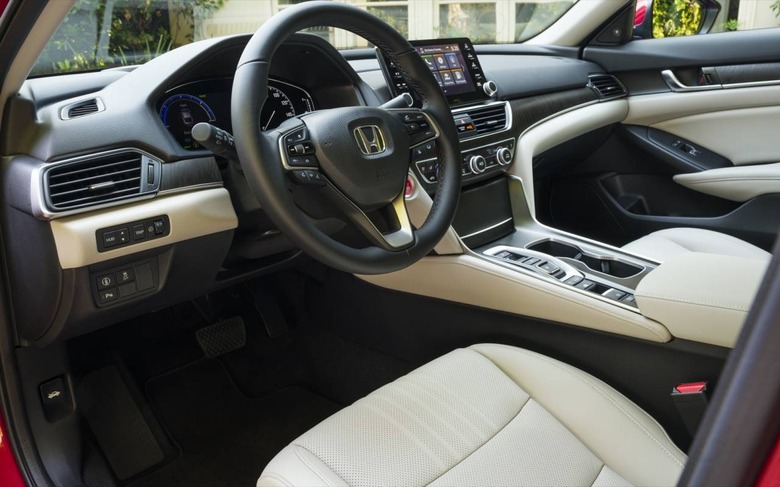
Personally, the sweet spot seems like the 2021 Accord Hybrid EX, which taps the biggest economy and power advantages without – at $30,320 plus destination – breaking the bank. Regardless of trim you still get a healthy 16.7 cu-ft of trunk space and a 60/40 split rear seat.
There's a big BEV-shaped hole in Honda's US line-up right now. The demise of the little-loved Clarity EV, combined with the automaker's decision not to bring the cutesy but range-lacking Honda E to North America, means fans of full electrification aren't high on options if they want a capital "H" on the hood. Hybrids, like the 2021 Accord Hybrid, are solid, but it's hard not to see them as an amuse-bouche for an entree that just doesn't exist yet.
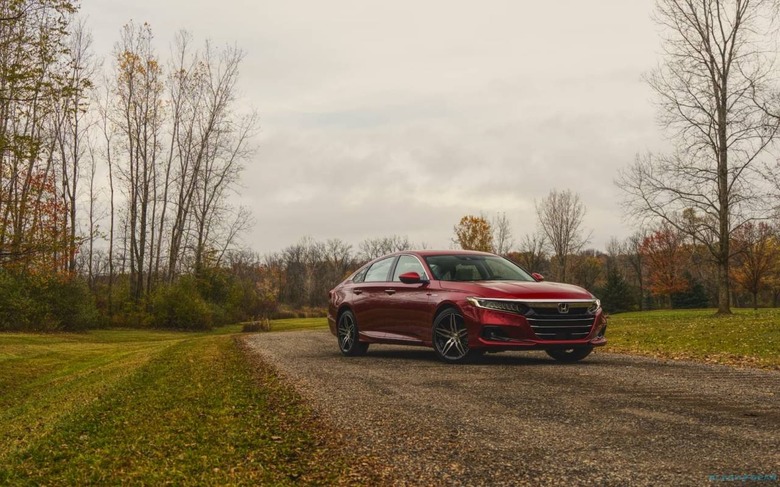
The good news is that Honda is aware of that gap. The General Motors partnership will bring at least two all-electric models to North America, and help Honda leapfrog both some R&D costs and the inherent time-sink of developing a new platform. In the meantime, it'll spread its two-motor hybrid system further throughout the existing line-up.
For now, though, the 2021 Accord Hybrid feels like half of a one-two punch that's yet to fully land. Familiar enough to be unthreatening, cleverly packaged so as to deliver economy gains with little in the way of drawbacks, and borrowing the well-deserved reputation the Accord has built up, it's perfectly placed to help ween electrification newbies off their gasoline teat. What it really needs is a plausible EV to hand them off to once they're convinced.
